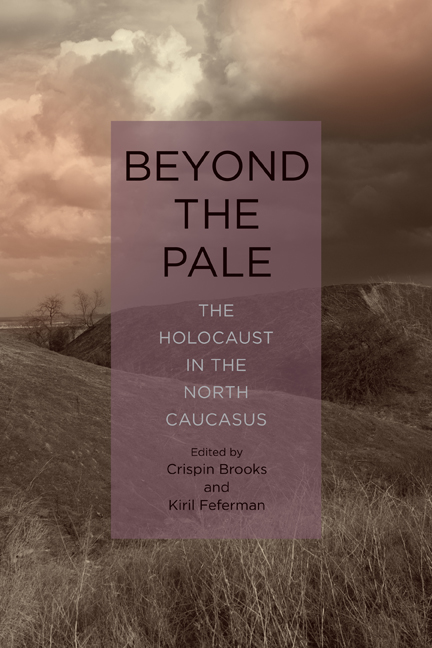Book contents
- Frontmatter
- Contents
- List of Illustrations
- Acknowledgments
- List of Abbreviations
- Note on Terminology
- Introduction
- 1 The Caucasus: A Rock in the Grinding Wheels of World History
- 2 Dwelling at the Foot of a Volcano? Jewish Perspectives on the Holocaust in the North Caucasus
- 3 “Operation Blue,” Einsatzgruppe D, and the Genocide in the Caucasus
- 4 The Kaukasier Kompanie (“Caucasian Company”): Soviet Ethnic Minorities, Collaborators, and Mass Killers
- 5 Mass Executions in Krasnodar Krai: Cross-Checking Sources for the Holocaust in the North Caucasus
- 6 In the Shadow of “Mass Treason”: The Holocaust in the Karachai Region
- 7 Rescue and Jewish-Muslim Relations in the North Caucasus
- 8 “We Were Saved Because the Occupation Lasted Only Six Months”: (Self-)Reflection on Survival Strategies during the Holocaust in the North Caucasus
- 9 The Holocaust on Soviet Territory—Forgotten Story? Individual and Official Memorialization of the Holocaust in Rostov-on-Don
- Glossary
- Bibliography
- List of Contributors
- Index
9 - The Holocaust on Soviet Territory—Forgotten Story? Individual and Official Memorialization of the Holocaust in Rostov-on-Don
Published online by Cambridge University Press: 06 October 2020
- Frontmatter
- Contents
- List of Illustrations
- Acknowledgments
- List of Abbreviations
- Note on Terminology
- Introduction
- 1 The Caucasus: A Rock in the Grinding Wheels of World History
- 2 Dwelling at the Foot of a Volcano? Jewish Perspectives on the Holocaust in the North Caucasus
- 3 “Operation Blue,” Einsatzgruppe D, and the Genocide in the Caucasus
- 4 The Kaukasier Kompanie (“Caucasian Company”): Soviet Ethnic Minorities, Collaborators, and Mass Killers
- 5 Mass Executions in Krasnodar Krai: Cross-Checking Sources for the Holocaust in the North Caucasus
- 6 In the Shadow of “Mass Treason”: The Holocaust in the Karachai Region
- 7 Rescue and Jewish-Muslim Relations in the North Caucasus
- 8 “We Were Saved Because the Occupation Lasted Only Six Months”: (Self-)Reflection on Survival Strategies during the Holocaust in the North Caucasus
- 9 The Holocaust on Soviet Territory—Forgotten Story? Individual and Official Memorialization of the Holocaust in Rostov-on-Don
- Glossary
- Bibliography
- List of Contributors
- Index
Summary
No other event serves more as a defining moment for the majority of Russians than the defeat of Nazi Germany during World War II. Ludmila Lutz-Auras defines the country's self-perception and view of its wartime past as a constant shift between pride and humiliation. The immediate post-SovietBoris Yeltsin era was characterized by harsh disputes among pro-Soviet and reformist historians regarding the need for an entirely new historiography of the war as well as by a growing disillusionment about the widely anticipated quick changes for the better that many Russians had expected from the democratic reforms. Throughout the turbulent 1990s, the defeat of Nazi Germany remained the only event from the Soviet past that evoked positive associations among the population and stayed an inherent part of Russian memory culture. Consequently, it lacked a truly fresh approach toward the question how to assess the victory. Yeltsin's successor, Vladimir Putin, sensed the “Appeal of Communism,” as David Satter terms it, and his taking office on New Year's Eve 2000 marked the beginning of a memory politics that put the defeat of Nazi Germany anew at the center of Russia's self-image, thus consciously seeking a connection between past and present. This nearly unreflected continuation of the old conception of history bears problematic aspects, however. This particularly applies but is not limited to the role of the Holocaust that had not been part of Soviet historiography and was likewise mostly absent in its early post-Soviet version. Russian memory politics of recent years have, however, brought about a number of important changes regarding the treatment of the Holocaust.
This article analyzes the local postwar and post-Soviet treatment of a mass atrocity that was committed by Sonderkommando (SK) 10a of Einsatzgruppe D in Rostov-on-Don. It discusses what narratives persist at a place where a large Jewish community ceased to exist in August 1942. Based on results of a local case study on individual memories and interpretations of the mass atrocity, this article furthermore demonstrates the role of what Aleida Assmann defines as “communicative memory”—the recollections of events and personal experiences that are shared within a community; for example, the family—of this event. Remembrance of it has been passed on, and knowledge about it today persists among Rostovans of various age groups.
- Type
- Chapter
- Information
- Beyond the PaleThe Holocaust in the North Caucasus, pp. 241 - 262Publisher: Boydell & BrewerPrint publication year: 2020



